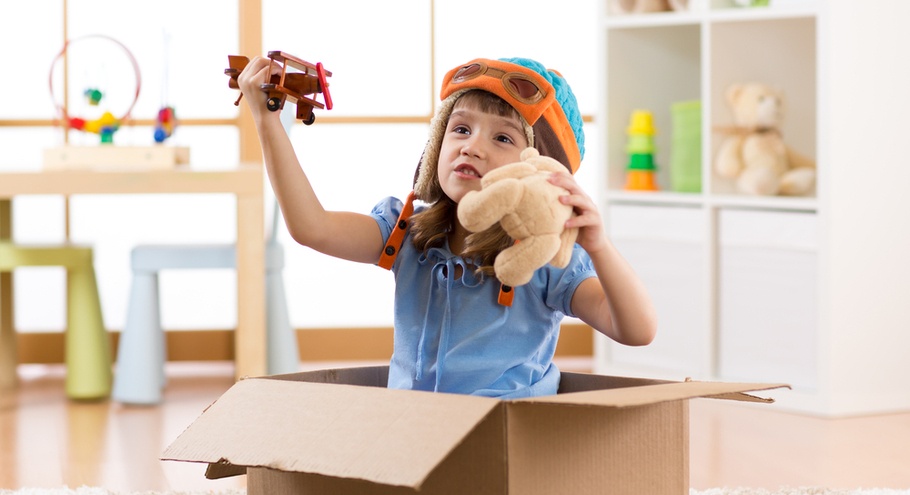When your child plays alone, it builds self-reliance skills and boosts creativity. It even gives you a break. Learn more about how to encourage independent play.
Children who play alone learn many valuable lessons they’ll carry with them throughout their lives. For instance, independent play boosts self-reliance and creativity, especially because they have no one to tell them what to play or take the lead. Solo playtime also helps your kids become well-rounded individuals who are comfortable in a variety of settings—including alone.
Plus, there’s evidence that over-scheduling kids—the opposite of independent play—can put too much pressure on kids and rob them of the benefits of play. It can even harm their health and their happiness. Here are eight more reasons why playing alone is important for children.
Teaches Self-Entertainment
Kids who play by themselves learn to have fun on their own. They don’t count on others for their happiness and entertainment. As your children grow, they understand that they won’t always have someone by their side every waking moment. They’ll be more confident and satisfied individuals.
Fosters Imagination
You may already feel like your child is full of imagination. Just wait until you step back and let them play by themselves! The time alone will draw out superheroes, princesses, and other play situations you wouldn’t get to see if they weren’t engaging in solo playtime. They’ll be quick to think on their feet and their creativity will shine.
Develops Social Independence
Playing alone develops a strong sense of independence in children. They don’t have to be around another person or a group of people at all times. This social independence will help them feel comfortable in any situation.
Playing by themselves doesn’t encourage your children to shy away from others. It prepares them for whatever your day holds—a morning of solo play, an afternoon with your playgroup, or an evening sleepover with a friend.
Encourages Calmness
Playing outside energizes kids while playing with others gives them a lot of interaction. Playing by themselves brings a sense of calmness to your kids. But time playing alone takes their mood to a different level. Many kids will spend time playing peacefully with their toys.
Teaches Self-Soothing
Kids want to know we are there for them when they need us, but learning how to play by themselves also teaches them to self-soothe. They count on you always, but they also learn how to look inward to solve problems. Your children begin to understand their own emotions better and can start communicating those feelings to you too.

Offers Security When Alone
As much as you would like to, you can’t interact with your children 24/7. You have chores to do and meals to put on the table. When your kids know how to play by themselves, they don’t rely on you as much to be their entertainment director. They also realize you’re not ignoring them by not playing with them. They’ll soon look forward to their time for individual play.
Gets Kids Ready for School
For preschoolers, you’re probably the number-one playmate your children have ever known. As you back away and show them how to play by themselves, they understand that you’re not always physically going to be there with them.
Playing alone gets children ready for school since you won’t be able to sit in the back of the classroom with them every day. They don’t feel abandoned because they are comfortable with playing alone. They also may feel more comfortable taking on a new adventure without you there.
Gives You Some Downtime
Another perk of teaching your kids to play alone is that you earn a much-needed break. This isn’t your primary goal, of course, but the time you spend alone is also a good example for your children. Your kids can see you enjoy doing the things you love alone and that you don’t need someone else’s attention 100% of the time to be happy.
How to Encourage Your Child to Play Independently
Some kids embrace independent play and don’t put up much of a fight when you announce that they need to play alone. But other kids resist the idea and will need a little more encouragement. Here are some ways you can encourage your child to play alone.
- Set the stage for them: Before encouraging your child to play alone, make sure you have some options for them. For instance, you can set out an area with blocks, an indoor playhouse, or a craft station. The key is that you help them with some options and then allow them to do the rest—alone.
- Refrain from making them leave the room: Kids want to be around the people they love, so don’t tell them to “go play.” Instead, allow them to play nearby. Sending them to another room to play will feel more like a punishment than an opportunity to have fun.
- Be a good example: If you want your child to learn how to play independently, let them see you doing things alone as well. Whether you go to a coffee shop to read, or you spend an hour practicing your favorite hobby, kids will emulate the behaviors they see. So, if you want them to be independent and have the confidence to do things on their own, you need to do the same.
